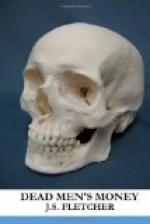It was to Chisholm that he put his first questions—casually, as if they were very ordinary ones, and yet with an atmosphere of meaning behind them that excited curiosity.
“You made a very exhaustive search of the neighbourhood of the spot where Crone’s body was found, didn’t you?” he inquired.
“A thorough search,” answered Chisholm.
“You found the exact spot where the man had been struck down?”
“Judging by the marks of blood—yes.”
“On the river-bank—between the river and a coppice, wasn’t it?”
“Just so—between the bank and the coppice.”
“How far had the body been dragged before it was thrown into the river?”
“Ten yards,” replied Chisholm promptly.
“Did you notice any footprints?” asked Mr. Lindsey.
“It would be difficult to trace any,” explained Chisholm. “The grass is very thick in some places, and where it isn’t thick it’s that close and wiry in texture that a boot wouldn’t make any impression.”
“One more question,” said Mr. Lindsey, leaning forward and looking Chisholm full in the face. “When you charged the man there in the dock with the murder of Abel Crone, didn’t he at once—instantly!—show the greatest surprise? Come, now, on your oath—yes or no?”
“Yes!” admitted Chisholm; “he did.”
“But he just as readily admitted he was in possession of Crone’s purse? Again—yes or no?”
“Yes,” said Chisholm. “Yes—that’s so.”
That was all Mr. Lindsey asked Chisholm. It was not much more that he asked the doctor. But there was more excitement about what he did ask him—arising out of something that he did in asking it.
“There’s been talk, doctor, as to what the precise weapon was which caused the fatal injury to this man Crone,” he said. “It’s been suggested that the wound which occasioned his death might have been—and probably was—caused by a blow from a salmon gaff. What is your opinion?”
“It might have been,” said the doctor cautiously.
“It was certainly caused by a pointed weapon—some sort of a spiked weapon?” suggested Mr. Lindsey.
“A sharp, pointed weapon, most certainly,” affirmed the doctor.
“There are other things than a salmon gaff that, in your opinion, could have caused it?”
“Oh, of course!” said the doctor.
Mr. Lindsey paused a moment, and looked round the court as if he were thinking over his next question. Then he suddenly plunged his hand under the table at which he was standing, and amidst a dead silence drew out a long, narrow brown-paper parcel which I had seen him bring to the office that morning. Quietly, while the silence grew deeper and the interest stronger, he produced from this an object such as I had never seen before—an implement or weapon about three feet in length, its shaft made of some tough but evidently elastic wood, furnished at one end with a strong iron ferrule, and at the other with a steel head, one extremity of which was shaped like a carpenter’s adze, while the other tapered off to a fine point. He balanced this across his open palms for a moment, so that the court might see it—then he passed it over to the witness-box.




